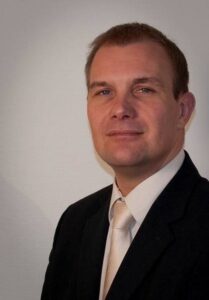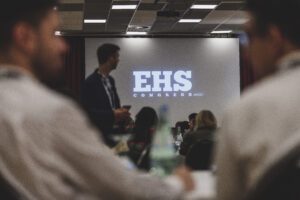Ahead of EHS Congress, taking place at the Estrel Congress Center in Berlin in May, SHP catches up with Vice President (VP) of EHS Renewables at GE, Claus Rose. Claus was the first person to implement a three-year Environment, Health and Safety (EHS) policy at his company and here he explains how he managed to do just that.
Tell us a little about your background and how you got into safety?

Claus Rose, President of EHS Renewables at GE
I spent 21 years in the Danish Armed Forces as an officer, I had worked in multiple areas and had been stationed abroad so I have a background in leadership and business administration. Once I left the armed forces, I decided to build my own business and I did that for about five years, in building construction and other areas. That’s where I got in contact with an individual from Siemens Wind Power who asked whether I could be interested in starting to build an EHS organisation.
My answer was ‘how difficult could it be?’
I jumped on board but I quickly realised there was a lot more to it than just that, but that was my entry into EHS. Over the years, I’ve gained an official background.
At GE you implemented a three-year EHS strategy, the first time a three-year plan was approved. Why did you think a three-year plan was important and how did you believe it would be effective?
Well, first and foremost, from a manager’s perspective a year is the business cycle, how people are being measured based on financial results. However, if you want to drive cultural transformation it’s going to be impossible for you to drive that in a year.
If that is the true alleyway that you want to drive towards, then you really have to think out-of-the-box. One of the ways that we identified was that we need to build it over more time. So three-years was what we saw to be the optimum and we were proven right.
I do believe one of the difficulties for EHS managers is having enough trust.
You know you can make that change, even though it’s very hard to predict because you’re dealing with human beings and human beings have one simple flaw, they do make mistakes. And that’s something that you cannot just cross off and say tomorrow you’re not going to make any mistakes. It doesn’t work like that.
So you’re up against uncertainty and management where you need to earn that trust, but more importantly, you also need to earn the commitment that they don’t want to deviate.
That’s why the three-year cycle was really important.
You created the new culture program Vision Safe and developed the Non-Supervised Learning EHS software MATE (Machine Learning & AI Tool) for EHS – how do you think other companies can be forward-thinking in these ways, and what do they need in order to achieve this?
 You have to create your elevator speech.
You have to create your elevator speech.
What is it that you want to achieve? You have to be able to get that down very, very crisp and concise.
So imagine you walk into an elevator and you move from ground floor up to the fifth floor, that’s the amount of time you have to convince somebody that what you’re trying to do is actually going to make the biggest change.
People are not very good at that because they are trying to tell a story and then this starts to lose people.
It’s very simple when you talk to managers that are being measured as just one thing, which is the financial performance, you need to hit the levels they understand.
I’m sorry to say, they couldn’t care less about you telling them ‘by doing this we will achieve X, Y and Z from an injury perspective’.
They want to understand how it relates to the business performance, so you have to transform that achievement into something they can relate to. Is it the bottom line improvement? Is it enhancing your free cash flow? Is it securing less quality problems? Because quality problems become an EHS problem and when it becomes an EHS problem it gets really problematic.
So, you have to really get your story straight and – more importantly – you need to make sure that everybody around you says exactly the same. And that is the hard part, because it’s kind of like brain washing every time you meet somebody, ‘just say this and nothing else, just say this’.
You have an EHS team of 400+ worldwide across 100+ different countries in activities involving manufacturing and installation – how do your challenges differ from country to country?
The culture is very different, so ‘one fits all’ may not work in all places.
That is part of the reality, however that can never be an excuse. I do believe that you can get to a point where one fits almost all, it’s actually feasible and we have demonstrated that with our Vision Safe programme, for instance, where one does fit because you just need to make sure there’s enough room for people to make tweaks when it’s needed. We did that.
We created the frame from which people could make subtle tweaks in order to make it work for them and also put the right language in front of the frontline workers so they got it.
Did it change the overarching perspective? No, it did not.
That takes a lot of effort because you really need to go and speak to people to make sure that you really understand it. People do act very differently, they have very different styles and there is a very different way of approaching people – if you want to drive a cultural change that is really important.
For example, I am Danish, I live in Germany and I’ve lived in the US. I have learnt multiple cultures and that taught me the fact that you need to make sure you adapt to their reality. That helps you move forward, but it also shouldn’t ever take away from who you really are at the end of the day, because you cannot change that.
Once you do get that kind of insight and you also help people in your team to make sure that they focus on these important aspects, you get traction very, very quickly.
You also need to find team members from different parts of the world that can help you drive that because they also need to be able to challenge you. So my team now is spread around the globe in different countries, different backgrounds, which is really important because it’s the only way that you can move an organisation faster.
What are you most looking forward to about attending EHS Congress, in Berlin, in May?
 With no shadow of doubt, it is the biggest event that is in that space and it is really, really crucial that you get an opportunity to meet with people from different organisations to learn and to exchange. So the exchange and sharing is really one of the things that I’m looking forward to most importantly.
With no shadow of doubt, it is the biggest event that is in that space and it is really, really crucial that you get an opportunity to meet with people from different organisations to learn and to exchange. So the exchange and sharing is really one of the things that I’m looking forward to most importantly.
From an agenda perspective, they have made a great effort in getting people to come and talk about topics that matter and they are not as traditional in the sense that they follow the stream of what everybody else is doing.
Back to the point that I made earlier, if you really want to make a change, you need to be bold enough to step outside of what would be the traditional way of doing it and I think they’re quite good at that.
You’ll be speaking at EHS Congress too, what can delegates expect from your session?
I’ll be talking about how you actually manage to get in a position where you have the capability to talk to your management about what you need.
You may need investment – as an example, our three-year plan needed to secure a substantial amount of money in order to do this, without having a very clear and precise outlook of what it might look like.

You’re going to put yourself in a position that if it does not materialise, you’re probably going to get kicked out of the business. That’s the reality. But let’s be very honest, what happens if a manager doesn’t deliver? Exactly the same.
So, Vision Safe was groundbreaking in an American-led company perspective because nobody had ever thought that would be possible, they’re very afraid of any legal potential liabilities and telling your contract that’s what they need to be doing is very untypical. So there are a lot of hurdles that you need to break in order to get there.
But what came out of that?
It has taken out almost 90% of our severe injury claims last year, compared to the year before, and it’s taken more than 40% of our recordable injuries out of the equation.
And that, of course, hits the bottom line.
But more importantly, it also gives the organisation a foundation to actually help safeguard their employees, their contractors and their customers, which is what we are really trying to do, because it can never be about money. You’re talking about individuals, employees, people, families and that’s where you need to have your focus. But at the end of the day, it has to be transferred into something that people can relate to.
They can relate to things that are being measured on, and this is what I’m trying to bring into the conference. What is the language that you need to be able to speak? What should be your strategy when you kind of go in front of the CEO and tell them this wild goose chase?
We have MADE as the only one in the world.
Why? Because we just had a very well prepared elevator speech. And then we just convinced people and when asked the question, do you think it’s possible? Absolutely. When? We can’t tell you, but I can tell you one thing, we’re going to fail again and again – and then we’re going to solve the issue.
And exactly that’s how it happened. But you cannot give any guarantee when it’s going to happen – you just need to be very, very firm on the fact it will happen.
You have to accept that you’re going to get slapped in the face a number of times when things don’t work out the way you anticipated, but does it mean you should change your focus? No.
That’s the problem. If you constantly redirect your focus, you try to do something else, then you become a problem instead of a solution. Then you’re not helping yourself and you’re not helping the business.
Hear more from Claus Rose at the 2023 EHS Congress, taking place in Berlin from 24-25 May 2023.
Click to register for your place and to see the full EHS Congress agenda.
Click here for more from EHS Congress on SHP.
The Safety Conversation Podcast: Listen now!
The Safety Conversation with SHP (previously the Safety and Health Podcast) aims to bring you the latest news, insights and legislation updates in the form of interviews, discussions and panel debates from leading figures within the profession.
Find us on Apple Podcasts, Spotify and Google Podcasts, subscribe and join the conversation today!


 You have to create your elevator speech.
You have to create your elevator speech. With no shadow of doubt, it is the biggest event that is in that space and it is really, really crucial that you get an opportunity to meet with people from different organisations to learn and to exchange. So the exchange and sharing is really one of the things that I’m looking forward to most importantly.
With no shadow of doubt, it is the biggest event that is in that space and it is really, really crucial that you get an opportunity to meet with people from different organisations to learn and to exchange. So the exchange and sharing is really one of the things that I’m looking forward to most importantly.
